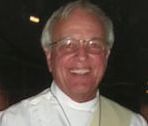Every January 25th, we commemorate and re-member St. Paul’s life-changing experience on the way to Damascus. Paul is struck by a great blinding light and Jesus speaks to him. It turns his life inside out. Paul is: Called to be an apostle of Christ (Messiah) Jesus by the will of God” 1Cor 1:1
On this January 25, I posed a question. Why did God choose Paul as the Messiah’s Herald to the Gentiles? Choose Paul! A Pharisee and a determined and zealous persecutor of followers of the Way!
What can anyone know of the mind of God? Whatever I conclude about “why Paul?” is really the result my reflections, inadequate as they are.
Just who is Paul? What manner of man is he? We read, study and contemplate what he said and wrote. We hear preached his Theology, his Christology. We were with him on the road to Damascus when he heard Jesus’ voice. We went with him on his missionary journeys. But what do we know about the man? Actually, not so much for someone so critical to the spread of believers in Jesus of Nazareth as the long-awaited Messiah, Son of God, God’s Word made flesh. We can only look at what he revealed about himself and what others said about him.
Paul is a Jew of the First Century CE, faithful to Israel’s God and Israel’s Law, living and acting within a diverse Jewish world. Acts 21:39 has Tarsus as Paul’s home city. In Paul’s early years, he studies under Gamaliel, a Pharisee and Doctor of Jewish Law. Paul states his studies in Judaism were beyond any of his peers, and he was far more zealous for the traditions of his ancestors. According to tradition, his use of athletic analogies, he may have been a competitive athlete in his youth. Later on, this allows him to withstand the rigors of travel, the beatings and imprisonment he endures for his faith.
Paul becomes a true believer that Jesus of Nazareth, crucified and resurrected in Glory is the Messiah of God. Yet he tells us: “I myself am an Israelite, a descendant of Abraham, a member of the tribe of Benjamin. I hold the same hope in God as the Pharisees in the resurrection of the righteous. I worship the God of my ancestors. I believe in all points of the Law and the prophets.”
He is convicted that: “God set me apart before I was born, called me through Grace, revealed The Son to me, to proclaim Jesus among the Gentiles.”
He explains how he begins to fulfill what God has appointed him to do. “I was not disobedient to the heavenly vision, but declared first to those in Damascus, then in Jerusalem and throughout the countryside of Judea, and also to the Gentiles, that they should repent and turn to God and do deeds consistent with repentance.”
He begins to proclaim his message to the followers of Jesus Messiah, to ecclesia (gatherings) of the Way in Judea: “I was still unknown by sight to the churches of Judea that are in Christ; they only heard it said, "The one who formerly was persecuting us is now proclaiming the faith he once tried to destroy. And they glorified God because of me.”
Paul continually advocates for his fellow Jews to come to Jesus Messiah: “In as much then as I am an apostle to the Gentiles, I glorify in my ministry in order to make my own people jealous and thus save them. Paul proclaims this of his fellow Jews, “God has not rejected his people whom he foreknew.”
Paul studied, taught, practiced and was zealously faithful to God’s revelations in the Law and the Prophets. He never really changed from this. He believed the man Jesus of Nazareth is the long-awaited Messiah, the fulfillment of the Law and the Prophets.
I reflect that God saw in Paul a man who remained true to God’s revelations and covenants to his ancestors. A man who came to believe in Jesus as the long-expected Messiah of God as a new covenant foretold in the Law and the Prophets. A man who with zeal and convicted faith proclaimed the Good News Of Jesus Messiah.
I found in Psalm 143 verses 5 and 8 that I’m sure Paul knew and could have taken to heart as an ancient hymn foretelling his apostleship.
“I recall the days of old, reflecting on your deeds, I ponder the work of your hands. I stretch out my hands to you, my heart like a land thirsty for you. Let dawn bring news of your faithful love, for I place my trust in you; show me the road I must travel for you to relieve my heart.”
On this January 25, I posed a question. Why did God choose Paul as the Messiah’s Herald to the Gentiles? Choose Paul! A Pharisee and a determined and zealous persecutor of followers of the Way!
What can anyone know of the mind of God? Whatever I conclude about “why Paul?” is really the result my reflections, inadequate as they are.
Just who is Paul? What manner of man is he? We read, study and contemplate what he said and wrote. We hear preached his Theology, his Christology. We were with him on the road to Damascus when he heard Jesus’ voice. We went with him on his missionary journeys. But what do we know about the man? Actually, not so much for someone so critical to the spread of believers in Jesus of Nazareth as the long-awaited Messiah, Son of God, God’s Word made flesh. We can only look at what he revealed about himself and what others said about him.
Paul is a Jew of the First Century CE, faithful to Israel’s God and Israel’s Law, living and acting within a diverse Jewish world. Acts 21:39 has Tarsus as Paul’s home city. In Paul’s early years, he studies under Gamaliel, a Pharisee and Doctor of Jewish Law. Paul states his studies in Judaism were beyond any of his peers, and he was far more zealous for the traditions of his ancestors. According to tradition, his use of athletic analogies, he may have been a competitive athlete in his youth. Later on, this allows him to withstand the rigors of travel, the beatings and imprisonment he endures for his faith.
Paul becomes a true believer that Jesus of Nazareth, crucified and resurrected in Glory is the Messiah of God. Yet he tells us: “I myself am an Israelite, a descendant of Abraham, a member of the tribe of Benjamin. I hold the same hope in God as the Pharisees in the resurrection of the righteous. I worship the God of my ancestors. I believe in all points of the Law and the prophets.”
He is convicted that: “God set me apart before I was born, called me through Grace, revealed The Son to me, to proclaim Jesus among the Gentiles.”
He explains how he begins to fulfill what God has appointed him to do. “I was not disobedient to the heavenly vision, but declared first to those in Damascus, then in Jerusalem and throughout the countryside of Judea, and also to the Gentiles, that they should repent and turn to God and do deeds consistent with repentance.”
He begins to proclaim his message to the followers of Jesus Messiah, to ecclesia (gatherings) of the Way in Judea: “I was still unknown by sight to the churches of Judea that are in Christ; they only heard it said, "The one who formerly was persecuting us is now proclaiming the faith he once tried to destroy. And they glorified God because of me.”
Paul continually advocates for his fellow Jews to come to Jesus Messiah: “In as much then as I am an apostle to the Gentiles, I glorify in my ministry in order to make my own people jealous and thus save them. Paul proclaims this of his fellow Jews, “God has not rejected his people whom he foreknew.”
Paul studied, taught, practiced and was zealously faithful to God’s revelations in the Law and the Prophets. He never really changed from this. He believed the man Jesus of Nazareth is the long-awaited Messiah, the fulfillment of the Law and the Prophets.
I reflect that God saw in Paul a man who remained true to God’s revelations and covenants to his ancestors. A man who came to believe in Jesus as the long-expected Messiah of God as a new covenant foretold in the Law and the Prophets. A man who with zeal and convicted faith proclaimed the Good News Of Jesus Messiah.
I found in Psalm 143 verses 5 and 8 that I’m sure Paul knew and could have taken to heart as an ancient hymn foretelling his apostleship.
“I recall the days of old, reflecting on your deeds, I ponder the work of your hands. I stretch out my hands to you, my heart like a land thirsty for you. Let dawn bring news of your faithful love, for I place my trust in you; show me the road I must travel for you to relieve my heart.”


 RSS Feed
RSS Feed